What It’s Like to Fly Semiprivate on JSX
JSX semiprivate flights offer more convenience than commercial flights for a price.
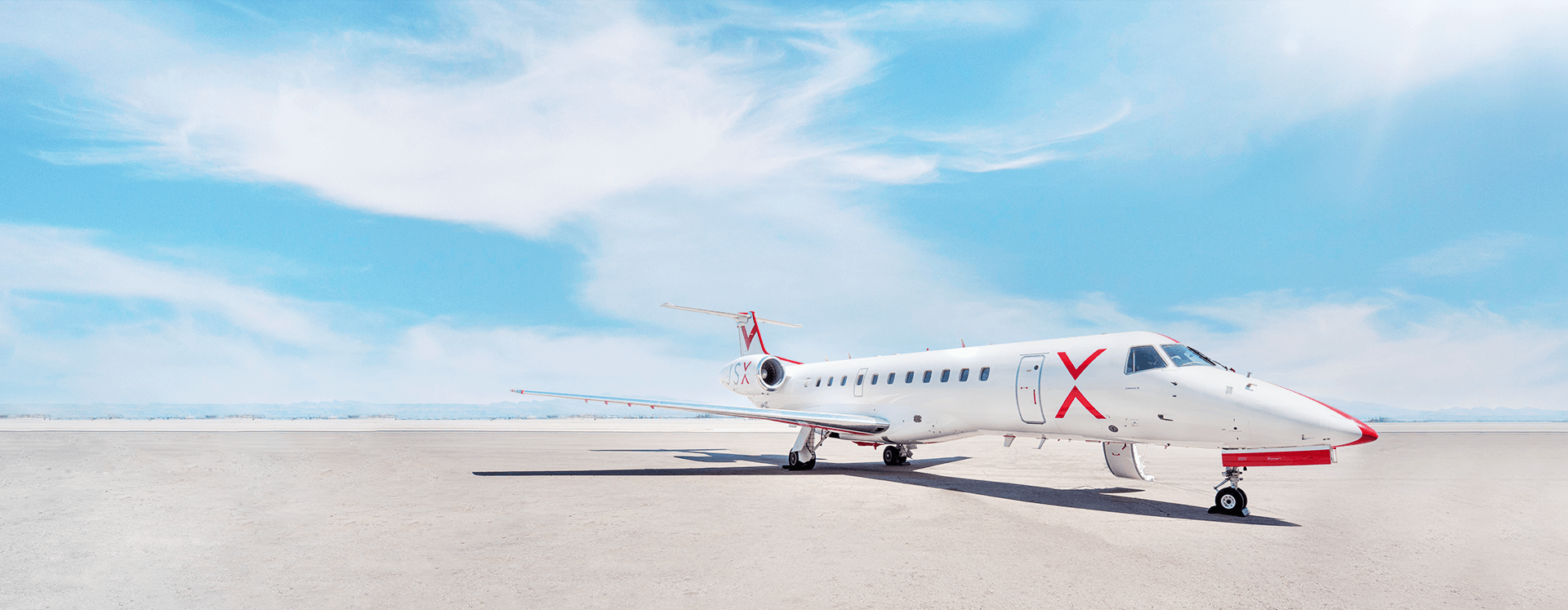
Many or all of the products on this page are from partners who compensate us when you click to or take an action on their website, but this does not influence our evaluations or ratings. Our opinions are our own.
Would you jump on the opportunity to fly "private" for the price of a normal airline seat? That's not as unheard of as it seems, thanks to an interesting (and relatively new) player in the travel space, JSX.
JSX launched in 2016 under the name JetSuiteX. And while the company lost some letters in its rebranding, it lost neither its luster nor its voluminosity. It's got dozens of routes within the U.S., with some international flights, too. And everything about it far fancier than any economy flight. Seats are big and comfier. Snacks are far beyond a paltry pack of pretzels. People praise its pet policy. And perhaps most appealing is the fact that you can board a JSX flight without ever stepping foot in a standard airport terminal.
And it might not be that much more expensive than a standard flight. Some routes cost as little as $300.
But what does flying semiprivate actually mean? Is JSX worth the additional cost? I booked a flight on JSX from Las Vegas to Los Angeles to see for myself. Here's an overview of my experience and what you need to know about flying JSX.

By signing up, you will receive newsletters and promotional content and agree to our Terms of Use and acknowledge the data practices in our Privacy Policy. You may unsubscribe at any time.
JSX experience onboard
To check JSX, I hopped on a flight from Las Vegas to Los Angeles. I booked the one-way flight for $109 eight days before departure.
When I flew in November 2021, JSX was remodeling its Las Vegas lounge. So the JSX check-in desk and the departure lounge were temporarily inside the nearby 5 Star Helicopter Tours building. JSX had ample signage to point travelers in the right direction.
Check-in agents were friendly and quickly issued my boarding pass — assigning me a window seat without me even having to ask. The entirety of the security measures consisted of the check-in agent asking if I had any prohibited items and swabbing my driver's license and backpack for explosives.
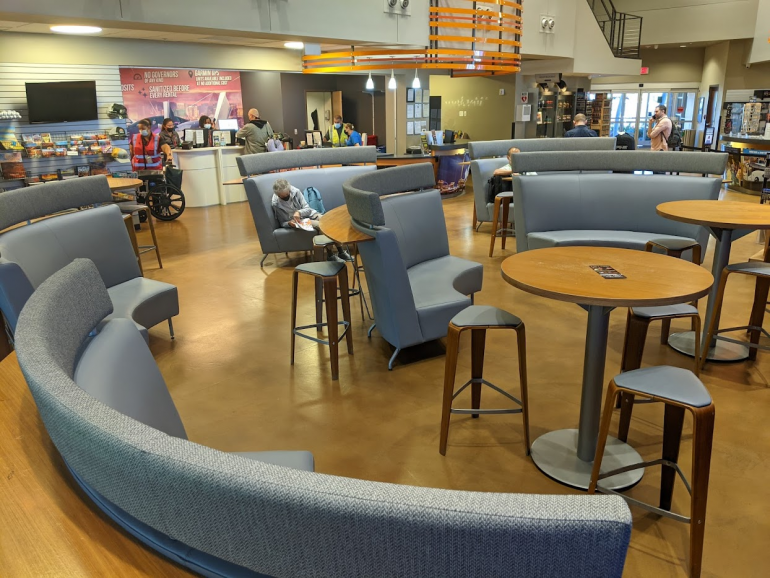
The departure lounge offered coffee, tea and a variety of seating options. The JSX lounge Wi-Fi speeds aren't going to win any awards — 4.66 mbps download, 5.23 mbps upload — but it was free and had low lag.
Boarding was announced 15 minutes before departure. It would've been a bit of a walk to the airplane from the temporary lounge. So JSX drove passengers to the plane on a private bus — which felt a bit excessive for the five passengers on our flight. Passengers were asked to drop their checked bags at the luggage cart next to the bus.
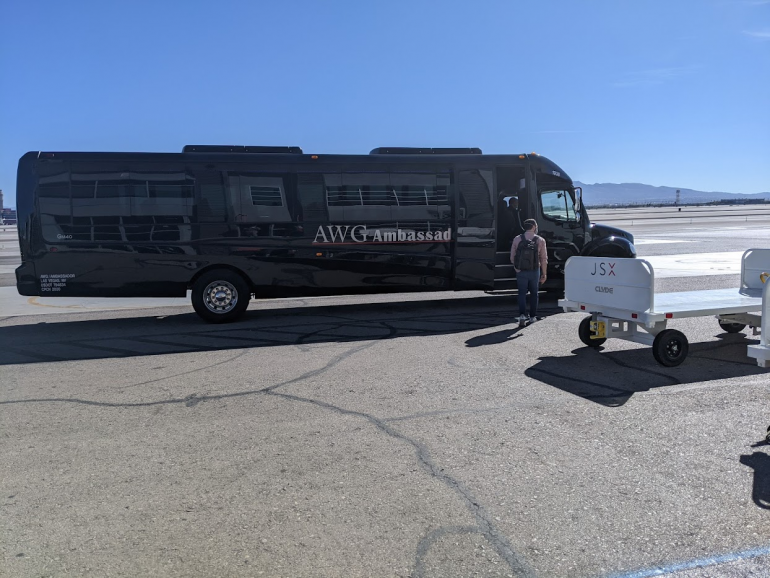
The solo flight attendant welcomed passengers on board. Our flight left the JSX hangar a few minutes early. After a short taxi, we took off before we even hit the scheduled departure time.
The flight attendant served drinks and snacks during the 43-minute flight. The plastic cups and packaged snacks from a snack basket felt a bit short of what you might expect when flying private. But for the price I paid, it was perfectly fine. No additional drinks or snacks were offered.
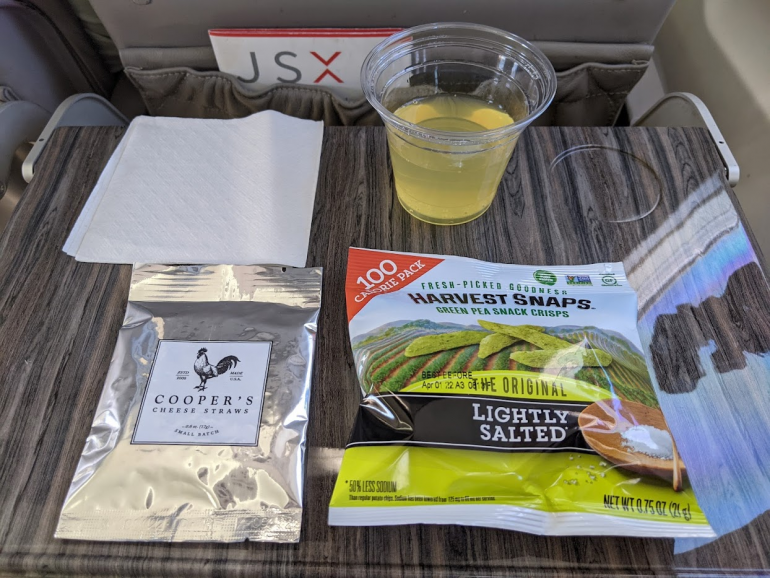
Arrival was just as seamless as departure. It took just minutes from touchdown to arriving at the Signature flight services parking spot. Then, it took only a couple of minutes to deplane, pick up bags from the back of the aircraft and walk through the Signature terminal to the pickup area.
Benefits of flying JSX
There are a lot of perks to flying semiprivate, but what stood out the most to me was the time savings. JSX requires that you arrive at the airport only 20 minutes before departure. And even that isn't strictly enforced. On my flight from Vegas to Los Angeles, a passenger arrived at the terminal within 20 minutes of departure and still made the flight.
You'll also save time on arrival. It took only 10 minutes from when we landed at LAX for me to get curbside for my ride. On a commercial flight, you're lucky if you're off the plane in 10 minutes. Then, you still have to get through the terminal, wait for checked bags and potentially need to take a shuttle to get to the rideshare pickup spot.
Also, depending on where you're flying, the JSX terminals could also get you where you want to go faster than the commercial airport terminal. For example, in Las Vegas, the JSX terminal is located much closer to The Strip than the commercial airport terminal.
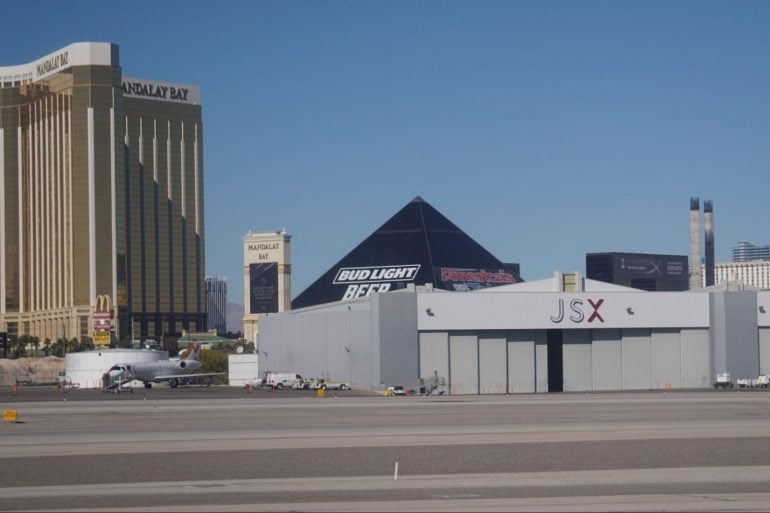
Flying on JSX also reduces a lot of the hassle of flying. The passenger who checked in late for my flight had limited mobility due to recent spinal surgery. For him, flying JSX meant getting dropped off at the front of the JSX terminal and only needing to walk a few hundred feet to check-in, then get to the transfer bus and get on the plane. To fly commercial between Las Vegas and Los Angeles would have required a lot more hassle and transfers throughout the process.
Faster (and free) Wi-Fi
Wi-Fi onboard is free. In May 2023, JSX completed the full installation of SpaceX’s Starlink in-flight Wi-Fi across its entire active fleet of 40 Embraer jets, thus bringing complimentary connectivity to all flights. Even better is that there's no annoying process to log in. Customers only need to select the network name — no need to input a credit card, loyalty program number, or watch forced advertising videos.
A decent pet travel policy
JSX is one of the best air carriers for flying with pets. Some major airlines ban furry friends entirely, while others charge big fees for them. JSX allows cats and dogs on board, and pets small enough to fit under incur just a $100 fee each way.
JSX routes
JSX services more than 20 destinations, which include Cabo San Lucas, Dallas, Houston, Austin, Miami, Westchester County, Nashville, LAX, Las Vegas, Denver, Crested Butte, Oakland and Phoenix. Together, those flights make up about 750 flights weekly. While that's tiny compared to the traditional carriers, it does have a reasonably large footprint.
And the company is growing. JSX says its fleet size expanded by 234% between 2021 to 2023, with a 142% increase in flights operated.
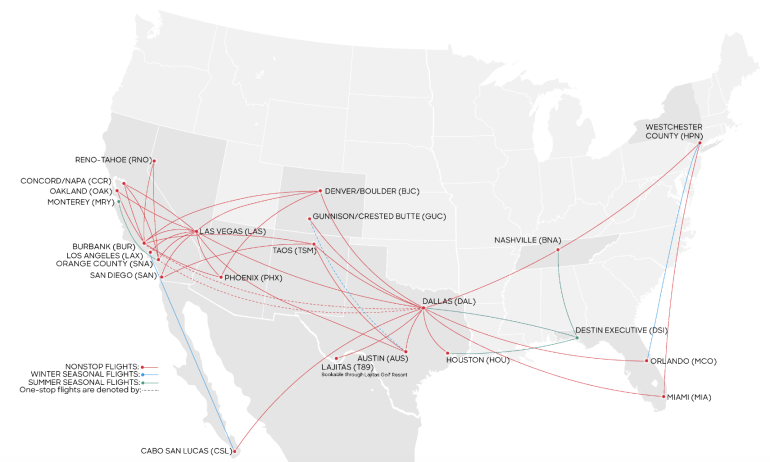
The JSX route map is constantly changing. Check out JSX's Where We Fly page for the latest route map.
JSX prices
JSX offers two types of fares: Hop On and All In. Hop On is JSX's cheaper fare type — with fees for changes, cancellations and seat assignments. Upgrade to an All In fare to gain the flexibility to change or cancel your ticket without fees.
However, the price difference can be steep. On some routes and dates, Hop On fares can be just $109 each way while All In fares are $499 each.
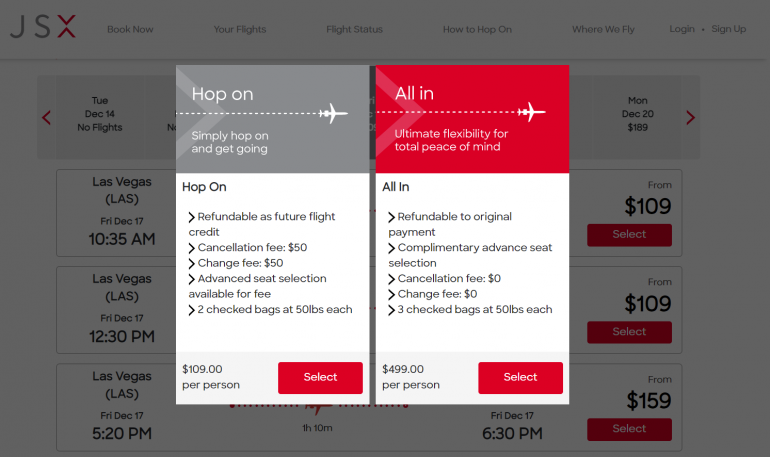
Change fees: JSX charges a $50 fee to change or cancel Hop On fares for travel credit. All In fares have no change or cancellation fees. Either way, you'll need to change or cancel at least an hour before departure to avoid forfeiting your ticket.
Bags: Hop On fares include two checked bags of up to 50 pounds each plus a small personal item, such as a purse or backpack. All In fares get a third free checked bag up to 50 pounds. For both fare types, additional and overweight bags cost $50 each.
Seat assignments: Travelers on Hop On fares need to pay $10 to $30 to book a seat assignment ahead of check-in. All In flyers get free seat selection.
Other fees: JSX charges a $20 fee per passenger for flights booked over the phone. Besides this and the $100 fee for pets small enough to fit under the seat, there are no other fees to note. Drinks and snacks are complimentary.
Unaccompanied minors: Another important thing to note is that travelers younger than 14 aren't able to travel alone on JSX. Travelers who are 14 to 18 can travel alone, but cannot accompany someone under 14.
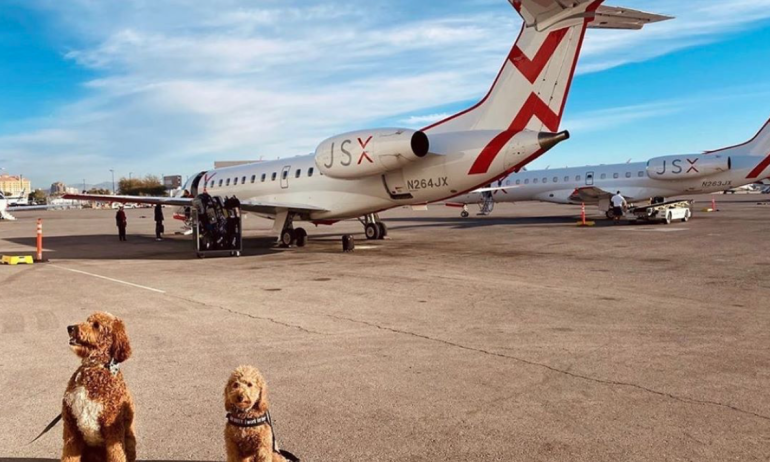
JSX pet policy
If you want to fly private is because you want an easier experience traveling with a pet, JSX is often considered one of the best air carriers for traveling with pets. That used to be because small cats and dogs could fly free of charge, but that's no longer the case.
Now, small cats and dogs can be transported in-cabin for a fee of $100 per one way flight. There are a few other rules, including that pets must have valid health and rabies vaccination certificates, and be well-behaved.
A maximum of five animals are allowed to travel on any given flight, and JSX can deny boarding to any additional pets, regardless of which category they fall into. You should notify JSX that a pet is coming along when you book your ticket. Check out JSX’s pet policy here to ensure you comply with all regulations, but here's an overview of the rules:
Small pets
JSX allows one small dog or cat per passenger, as long as the pet remains in a small (13 by 11 by 17 inches), approved pet carrier under the seat in front of you for the entire flight. When booking your ticket and when checking in with the concierge at the airport, indicate that you’re traveling with a pet.
Medium-to-large dogs
Medium-to-large dogs can fly in the cabin. But if your dog cannot fit under the seat in front of you, you’ll have to purchase a separate seat so that your pet can lay on the floor directly under the seat, which might get expensive. Call customer service at 800-435-9579 to purchase the extra seat for your pooch.
The dog must weigh 79 pounds or less and remain leashed.
Emotional support animals
JSX currently does not allow emotional support animals onboard its flights.
Service animals
The public charter jet service allows dogs trained as service animals on its flights. If you have more than one animal with you, you’ll need to speak to the booking staff. The animal must remain on the floor but can be on your lap if it's small.

JSX aircraft and seats
JSX flies Embraer ERJ-135 and ERJ-145 aircraft. These aircraft are typically used by larger airlines to operate regional flights in smaller markets.
JSX's FAA certification limits JSX to 30 seats on each aircraft. That means there can be awkwardly large gaps at the front and back of some aircraft.
The onboard experience will depend on where you're flying. On most JSX flights, aircraft are arranged with 10 rows of seats in a 1-2 arrangement — meaning one seat on one side and two seats on the other side. Because of this, you might rub elbows with another passenger on full flights.
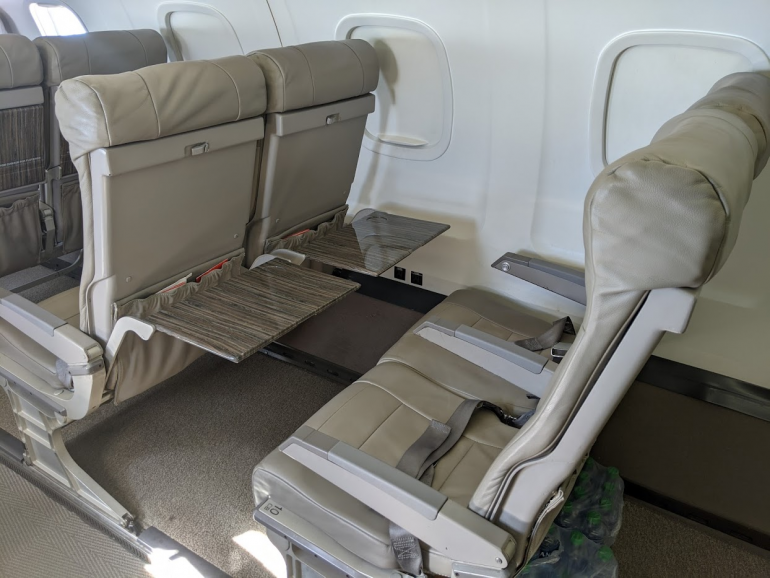
However, JSX's Texas-based ERJ-145 aircraft are arranged in 15 rows with one seat on either side of the aisle. That means you won't have to worry about having a neighbor on these flights.
Seats are arranged with 35 to 36 inches of pitch. That's OK for most passengers to have enough legroom. However, it's less pitch than you'll find in business or first class on many airlines.
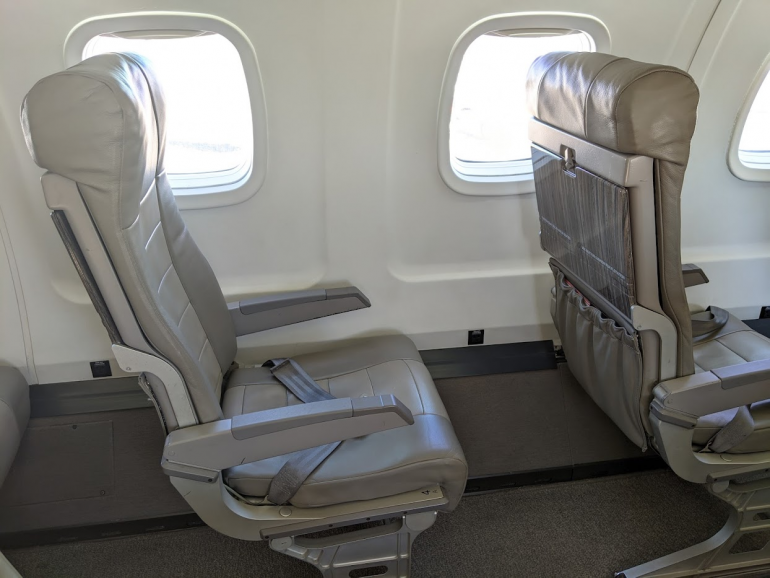
Earn miles on United or JetBlue when flying JSX
JSX doesn't have its own loyalty program. Instead, JSX partners with JetBlue's TrueBlue program and United's MileagePlus program for mileage earnings on flights. The earning rate for TrueBlue is simple. You'll earn 150 TrueBlue points on Hop On fares and 250 TrueBlue points on All In fares.
MileagePlus members will earn:
- 50% of miles flown in fare classes N, H, and P.
- 75% of miles flow for fare classes W, G and Q.
- 100% of miles flown for fare classes Y, B, E, M, V, S, D and T.
What's more, to launch this earnings partnership, MileagePlus members will also earn at a bonus rate for a limited time:
- MileagePlus Member: 5x miles.
- Premier Silver: 7x miles.
- Premier Gold: 8x miles.
- Premier Platinum: 9x miles.
- Premier 1K: 11x miles.
Is flying JSX worth it?
On most routes and dates, you're likely to find cheaper airfare on a commercial airline. But it's hard to beat the convenience of flying JSX. Between the private terminals, spacious seats, friendly service, and free snacks and drinks, the price difference should be worth it for many travelers.
Plus, with money-saving perks like two free checked bags and no pet fees in most situations, it might actually be cheaper for some travelers to fly JSX than a conventional airline.
(Top photo courtesy of JSX)
How to maximize your rewards
You want a travel credit card that prioritizes what’s important to you. Here are some of the best travel credit cards of 2026:
- Flexibility, point transfers and a large bonus: Chase Sapphire Preferred® Card
- No annual fee: Wells Fargo Autograph® Card
- Flat-rate travel rewards: Capital One Venture Rewards Credit Card
- Bonus travel rewards and high-end perks: Chase Sapphire Reserve®
- Luxury perks: American Express Platinum Card®
- Business travelers: Ink Business Preferred® Credit Card
Article sources
NerdWallet writers are subject matter authorities who use primary,
trustworthy sources to inform their work, including peer-reviewed
studies, government websites, academic research and interviews with
industry experts. All content is fact-checked for accuracy, timeliness
and relevance. You can learn more about NerdWallet's high
standards for journalism by reading our
editorial guidelines.
Limited Time Only: Earn $1,000 Toward Travel!
Capital One Venture Rewards Credit Card 
Travel

For a limited time, the
Capital One Venture Rewards Credit Card is offering new cardholders an especially rich bonus: Enjoy $250 to use on Capital One Travel in your first cardholder year, plus earn 75,000 bonus miles once you spend $4,000 on purchases within the first 3 months from account opening - that’s equal to $1,000 in travel!
More like this
Related articles









